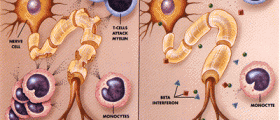Multiple sclerosis is a neuromuscular disease which is responsible for damage and slow degeneration of nerve cells in the central nervous system. As a result voluntary muscles innervated by the affected nerves stop responding properly.
Cause of Multiple Sclerosis
The nerves in the brain as well as those in the spinal cord are normally covered with myelin, a material that forms a specific sheath. It acts as powerful electrical insulator. In people suffering from multiple sclerosis there is progressive damage to myelin, the nerves become denuded and the transmission of nerve impulses becomes severely affected.

Damage to myelin and all the accompanying problems are the result of inadequate immune response of the body.
Multiple Sclerosis Stages
Stages of multiple sclerosis are connected to four types of the disease. There are relapsing-remitting multiple sclerosis, primary-progressive multiple sclerosis, secondary-progressive multiple sclerosis and finally, progressive-relapsing multiple sclerosis. Apart from this classification multiple sclerosis can be classified as benign and malignant.
Benign Multiple Sclerosis
Benign multiple sclerosis is actually a type of relapsing-remitting multiple sclerosis. This is a rather mild disease.
People suffering from benign multiple sclerosis develop only one or two symptoms that occur a few times. After dealing with those health issues, one usually does not experience recurrence of symptoms. Remission is quite long and lasts for many years. The symptoms are easily dealt with and cause no permanent damage or disability.
Malignant Multiple Sclerosis
Malignant multiple sclerosis is also known as acute multiple sclerosis (Marburg's variant). This type of multiple sclerosis is not so frequent. It may actually be classified under primary-progressive multiple sclerosis (another form that rarely occurs).
This type of multiple sclerosis is characterized by quick progression once the symptoms occur. The disease is rapid and symptoms become more intensive within a year. Such patients, unfortunately, end up with severe disability.
Malignant multiple sclerosis does not affect many patients.
End Stage of Multiple Sclerosis
End stage of multiple sclerosis is actually advanced stage of the disease.
People suffering from relapsing-remitting multiple sclerosis may eventually end up with severe disability. This does not mean that all patients suffering from multiple sclerosis will eventually have to face severe disability. In some of them the condition is successfully brought under control with medicamentous therapy.
In advanced stage there is serious and irreversible damage to function of affected nerves and muscles they innervate. The neurological sequelae are complex and they are not the same for all patients. This is why the extent of disability generally differs. Still, patients in advanced stage usually require someone else's help because they simple cannot function on their own.
If an individual reaches this stage, where their disabilities result in severe difficulties which may not respond to treatment and lead to life-threatening complications, they are considered to have end stage MS. Some of the symptoms that can make an individual vulnerable are:
- very severe bladder and/or bowel problems - which lead to recurrent infections or regular hospitalisation,
- increased susceptibility to respiratory infections - which can lead to repeated bouts of pneumonia,
- swallowing problems - which can cause choking or aspiration pneumonia (where food or fluid enters the lungs),
- feeding difficulties - which may require a feeding tube or result in severe weight loss,
- difficulties breathing due to weakening of the respiratory muscles,
- losing the ability to speak,
- pressure sores due to immobility - which are at risk of becoming infected,
- developing blood clots due to lack of mobility,
- increased levels of pain,
- mental confusion or disorientation.














-And-Multiple-Sclerosis-Differences-And-Similarities_f_280x120.jpg)

_f_280x120.jpg)
Your thoughts on this
Loading...